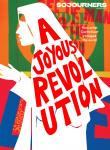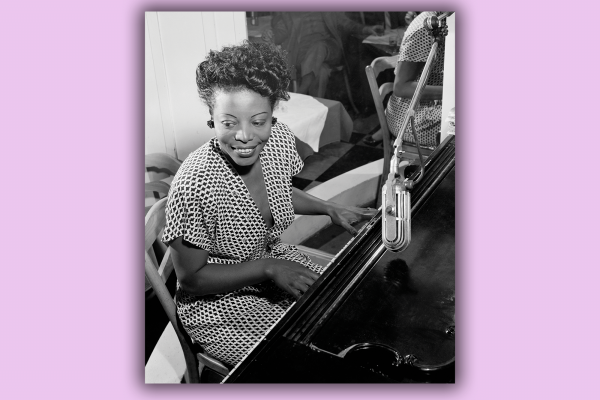FROM THE 1920s until her death in 1981, Black jazz pianist and composer Mary Lou Williams injected energy and innovation into the genre and, via three jazz Masses composed after her conversion to Catholicism in the 1950s, into the church. Still, her music is sometimes overlooked, while the popularity of male jazz musicians’ work—including her mentees Thelonious Monk and Charlie Parker—persists.
In this century, Deanna Witkowski is amplifying Williams’ works of music and faith. Witkowski is a jazz pianist herself, inspired by Williams, and a doctoral student in the jazz studies program at the University of Pittsburgh. She is restoring and recording general and liturgical compositions by Williams, some of which haven’t been recorded since 1944. And she has written a biography of the pioneer, Mary Lou Williams: Music for the Soul (Liturgical Press). Witkowski spoke with Sojourners associate editor Da’Shawn Mosley about the book and its namesake.
Da’Shawn Mosley: How did you become interested enough in Mary Lou Williams to write a biography of her?
Deanna Witkowski: In 2000, Dr. Billy Taylor, a jazz musician himself and the judge from a jazz piano competition I had played the year before, contacted me and said, “Come bring your quintet to play at the Mary Lou Williams Women in Jazz Festival at the Kennedy Center in the spring.” And so of course I said, “Yes, I would love to do this.” And then thought, “I really don’t know Mary Lou Williams’ music.” That’s a very common thing, even among jazz musicians or aficionados. She has this reputation [as] this great pianist and composer who wrote big-band music for Duke Ellington and Benny Goodman and mentored all these famous jazz musicians—so we know Thelonious Monk. But her compositions aren’t very well known.
So, I contacted a trumpet player named Dave Douglas. He’d just done a tribute record for Mary Lou. I emailed him and said, “Could you tell me some records to check out?” There was a new biography of her then called Morning Glory, by Linda Dahl, so I read that and learned how [Williams] converted to Catholicism and wrote all this liturgical music. That really hooked me because I had just written my first jazz Mass for a church where I was a music director. So, I felt like, “Oh, OK, there’s someone else who has done this; she’s this badass player and super swingy and plays all these different styles of jazz,” and I kept getting more deeply into her music.
What techniques or innovations set Williams apart from her peers? She would play huge, full, two-handed chords very densely and a lot of crunchy, tense, dense chord voicings that don’t sound like anybody else. They kind of relate to the harmony but not exactly. And she prided herself on having a very strong left hand, meaning when she’s comping for a soloist or for herself, her groove, you really feel it in her left hand.
Performing jazz often seems spontaneous. Was writing this biography a contrast to that? There’s sometimes a misconception—or rather a mystery—about jazz: “What’s improvisation? What do you do?” Last week I played a jam session and this lady asked me, “Well, how do you all know what to play at the same time? What happens? It just comes out of the air?” No, we’re agreeing on a set of parameters that may be the structure of a song, or just a rhythmic groove, or one note. And then there’s all the work and discipline of figuring out what notes and what rhythms sound good and how do I put them all together so that, eventually, I don’t have to think about that stuff.
I am definitely not at that point in my writing. I thought about every sentence in this book. One thing that really helped me was that a few of us from a writing workshop at the Collegeville Institute a couple summers ago [would get] together at 6 a.m. on Facebook just to check in, then an hour later we would check out and say, “This is what I did,” even if it was just two sentences. So that really helped me, just having a little bit of accountability.
Did you learn anything about Williams while researching this book that surprised you? I knew about this a little, but I spent more time with it: In Mary Lou’s archives at Rutgers University’s Newark Institute for Jazz Studies, there’s this huge section that’s just correspondences. I had read in earlier biographies letters that she wrote to a Franciscan brother, Brother Mario Hancock, who was a very close friend of hers in the ’60s. But what I hadn’t seen were all these letters that she had to nuns, and that really touched me. There was one in particular that I talk about in the book, with a Cenacle Sister named Martha Mulligan. I pieced together that Mary Lou went on spiritual retreats whenever she could. I couldn’t always pinpoint exact dates, but whenever she was touring, she would try to go on retreat for a few days. And it seems like every time she did that, she would make friends with another nun and then start writing them. It was so apparent—because I’m reading letters back from Sister Mulligan—that Sister Mulligan was relying on Mary Lou for comfort, sustenance, for friendship, just as much as Mary Lou was relying on her.
There are other letters I found from when Mary Lou had a thrift shop in Chelsea, in New York City, and she found a nearby Catholic convent. There were letters from nuns there asking when she was going to visit again.
I knew Mary Lou had at some points—maybe not super specifically—talked about possibly wanting to be a dedicated woman religious. I think that her friendships with these women helped her to realize that she was doing a religious vocation, a religious calling, whether it was sacred music or not. In the other biographies and stories, we always hear about these priests or men who were her spiritual advisers, and they were, but there were these women too. I feel like that’s a story that doesn’t get told so much. I just got a research grant from the University of Notre Dame to focus on Mary Lou’s letters with women religious for a 20-year period. So, I have to get back to Rutgers, once they’re having in-person researchers again, and mine those boxes more and flesh out those relationships.
Amazing! The work continues. In January, I recorded with my regular trio and a trumpet player, and then a trio with Pittsburgh musicians, all Mary Lou compositions. Some of the pieces have not been recorded since 1944. And I’m creating a new performance edition of her third Mass for the Mary Lou Williams Foundation.
One track I thought I was going to include on the record but decided not to is an arrangement of hers from the early ’40s of the George Gershwin tune “Lady Be Good.” The melody she does on that is the same melody on a tune [recorded in 1954] by Thelonious Monk called “Hackensack.” And if you ask any jazz musician, if they hear the melody, what it is, they’re gonna say, “Hackensack.” Well, it’s Mary Lou’s arrangement from years before Monk recorded it. Monk and Mary Lou were very good friends, so it’s not like he stole it or whatever. But there are elements of her music—bridges and tunes—that are like, “This sounds like Monk.” It should be, “No, this sounds like Mary Lou,” because she’s the originator. This happens all the time. I just had a percussionist I saw on Saturday tell me, “Yeah, before I met you, before you came to Pittsburgh, I didn’t listen to Mary Lou much. And now, when I listen to Monk, I hear the stuff that’s coming from Mary Lou.”

Got something to say about what you're reading? We value your feedback!






